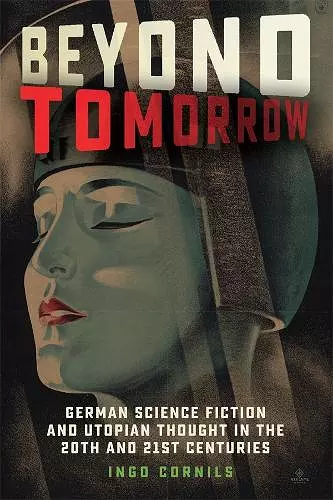Beyond Tomorrow
German Science Fiction and Utopian Thought in the 20th and 21st Centuries
Format:Hardback
Publisher:Boydell & Brewer Ltd
Published:15th Sep '20
Currently unavailable, and unfortunately no date known when it will be back

Shows German Science Fiction's connections with utopian thought, and how it attempts Zukunftsbewältigung: coping with an uncertain but also unwritten future. Since its beginnings, German Science Fiction (or SF) has engaged with social change and technological progress, often drawing from utopian thought. The writer Kurd Laßwitz challenged the authoritarian Wilhelmine order; later, film director Fritz Lang provided a searing critique of Weimar society. Meanwhile utopian thinkers like Ernst Bloch and Herbert Marcuse insisted on the possibility of hope, even in the face of totalitarianism. During the Cold War, German utopian writing and filmmaking were vital both as a warning and as a creative imagining of possible futures. More recently, as rapid scientific and technological advances have continued, literary and cinematic responses have become increasingly dystopian in outlook, reflecting fears connected with globalization, advances in artificial intelligence and genetic engineering, and persistent challenges like climate change, hunger, migration, and terrorism. This book explores German SF's responses to the question how humanity can match technological advances with social, ethical, and moral progress. It surveys German utopian thought and the German SF tradition-both literary and cinematic-providing close readings of selected works that paradoxically reflect boundless optimism for the possibility of change and increasing pessimism in its likelihood. English translations are provided throughout. Building on its rich tradition but now confidently entering the mainstream, German SF attempts Zukunftsbewältigung: coping with an uncertain but also unwritten future.
[M]eticulously researched and lucidly written tour de force. * GEGENWARTSLITERATUR *
In his in-depth survey of the genre, Cornils brings an investigation of 125 years of science fiction to an otherwise linguistically limited Anglophone audience. * THE YEAR'S WORK IN MODERN LANGUAGE STUDIES *
Cornils's work surveys a German SF landscape largely unknown to Anglophone readers, not least because many works have remained untranslated. That alone is a valuable service his book provides. [...] [W]hile it is useful for the monolingual Anglophone reader, this book is most valuable for those who are bilingual, and for those specifically interested in the state of discourse and commentary within Germany, by German literary critics, about German science fiction. * GERMAN POLITICS AND SOCIETY *
Beyond Tomorrow deserves high praise. Cornils (Univ. of Leeds, UK) provides in-depth treatment of 70 German science fiction prose works and 25 films of the last 125 years, and the result is a sort of compendium of German science fiction. This remarkable achievement is further enhanced by clear writing free of jargon. Most of the works Cornils treats and most the sources he cites are in German, but every German quotation is excellently translated. . . . Summing up: Essential. Upper-division undergraduates through faculty. * CHOICE *
The study's strength lies in its broad overview of German science fiction literature and film: Ingo Cornils traces the historical trajectory of science fiction ranging from its beginning at the end of the nineteenth century to recent publications. His comprehensive study . . . evokes a fascinating panorama of a yet undervalued literary field . . . . German studies in Anglophone countries will especially benefit from . . . this compendium, as it not only provides translations for all literary quotes but also all quoted secondary sources . . . . * GERMAN STUDIES REVIEW *
Overall it should be said that Cornils's book fills a big gap for the Anglophone reader and is just as useful and informative for the German reader. His longer descriptions convey a good picture of the texts and films he covers. He provides interesting remarks on the peculiarities of the German variant [of sci-fi], especially in the postwar period, and with the concept of "Zukunftsbewältigung," or coping with the future, he has supplied a new keyword for science fiction. * ZEITSCHRIFT FÜR FANTASTIKFORSCHUNG *
[T]he publication of Ingo Cornils's study is to be welcomed: it marks a shift from the Anglophone preoccupation with the outdated discourse on Vergangenheitsbewältigung towards what Cornils aptly calls Zukunftsbewältigung. . . . The scope of Cornils's study is astonishing: it deals with 70 novels and 25 films [as well as] a wide range of SF films and TV formats. . . . Cornils's book . . . offer[s] a rich survey of the German SF tradition. Its coverage will make it an indispensable reference point and source book for further analyses of an unduly neglected genre. * MODERN LANGUAGE REVIEW *
[G]estures toward the useful work to be done going forward in understanding German science fiction. . . . Cornils's efforts are necessary if scholars want to more fully understand the complex relationships between science fiction and society and how the former shapes human thought. * JOURNAL OF THE FANTASTIC IN THE ARTS *
[A]n important, thoughtful, and welcome contribution to German and global science fiction studies. It offers an impressive overview of the history and state of German science fiction, and will no doubt dilate many doors for readers of science fiction, old and new. * MONATSCHEFTE *
ISBN: 9781640140356
Dimensions: unknown
Weight: 584g
332 pages